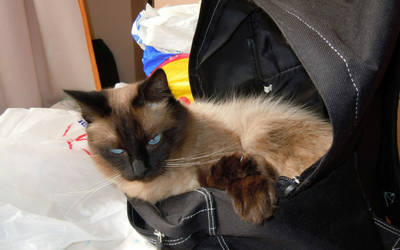
With the holiday season approaching, parties and festivities with family and friends are being planned! It’s important to keep in mind the hidden hazards that can be stashed away in guests’ handbags and coat pockets.
Many of the items we stick in our pockets or handbags can be toxic to our pets. We might not give those items a second thought, but a curious pet that smells something new and exciting might not stop pursuing that intriguing new smell.
Sugarless chewing gum, candies, and mints. Many of us carry chewing gum or mints around so that we don’t offend the people around us after we eat a garlic or onion filled meal. But many of these sugarless breath savers contain xylitol. Ingesting even the smallest amount of xylitol can cause life-threatening liver failure in dogs. Signs of xylitol poisoning include weakness, vomiting, muscle tremors, seizures, and coma. Gum and candies have strong scents and can easily attract dogs to root around in a handbag or coat pocket. In addition, gum wrappings and the tin or plastic containers that hold mints and candies can cause intestinal blockages if consumed. Even if they are empty they still carry the attracting scent of the gum or mints.
Medication. Many people carry over the counter or prescription medication in handbags and pockets. Of course we have to keep these at our fingertips, but if a dog or cat consumes pills that have spilled out of a container, tragedy may strike. Anti-inflammatory drugs like ibuprofen (Advil or Motrin, for example) can cause vomiting, diarrhea, and abdominal pain. Kidney failure can result in both dogs and cats. Acetaminophen (Tylenol, for example) ingestion can result in liver failure, and a small amount can be lethal in cats. Anti-depressants can cause vomiting, diarrhea, unpredictable reactions including sedation or agitation, and may also cause muscle tremors and seizures.
Asthma inhalers. Asthma inhalers are life savers to asthmatics – both pets and humans! However, if they are chewed on and punctured, they can deliver a large dose all at once and acute albuterol (the active ingredient in many inhalers) poisoning can occur. The signs of albuterol poisoning are elevated heart rate and blood pressure, incoordination, agitation, and vomiting. Your pet’s pupils may dilate giving him the “wide-eyed” look.
Cigarettes. Ingestion of nicotine can be toxic to dogs and cats, even in small quantities. Eating only a few cigarettes can cause serious illness in a small dog. Signs of nicotine poisoning include rapid heart rate, panting, muscle tremors, excessive excitement, and uncontrolled bodily functions (urination and defecation). In some instances, ingestion of nicotine can result in seizures, paralysis, and even death. Other sources of nicotine include chewing tobacco and nicotine gum and can cause the same signs.
Marijuana. With the advent of the legalization of marijuana in many areas, more people may have the drug with them. The active ingredient in marijuana, THC, is quickly absorbed from the gastrointestinal tract. Signs of marijuana toxicity include incoordination, involuntary eye movements, depression or excitement, agitation, hallucinations, vomiting, and heart arrhythmias.
Be sure to keep guest’s coats hung up in a closet away from prying little noses, or in a room where the door stays closed while the festivities are going on. Remind your guests to close up their handbags to avoid curious pets from rummaging through their belongings. The last thing anyone wants to be doing during the holidays is taking a sick pet to the veterinary hospital.